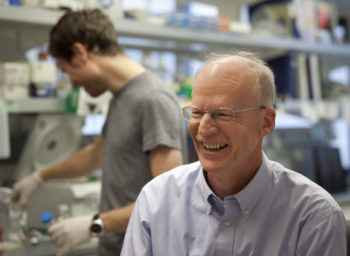
Biotechnology start-up GentiBio — a Seattle Children’s Research Institute spin-out — announced a multi-year collaboration with global pharmaceutical company Bristol Myers Squibb, the latest success story in the research institute’s rapid development of therapies and technologies that change children’s lives. Spin-off companies and biotechnology/pharmaceutical industry collaborations are a critical part of accelerating and expanding the reach of these innovations.
GentiBio is collaborating with Bristol Myers Squibb to develop new engineered regulatory T cell (Treg) therapies to re-establish immune tolerance and repair tissue in patients living with inflammatory bowel diseases, which cause debilitating and life-threatening chronic inflammation of the gastrointestinal tract. Current therapies are largely focused on systemic anti-inflammatories and broad immunosuppression, which can cause adverse effects and are not curative.
In a healthy immune system, Tregs help keep the body’s immune response in balance. In autoimmune, alloimmune and inflammatory diseases, such as inflammatory bowel disease and type 1 diabetes, this balance is disrupted. Engineered Treg therapies aim to restore immune system balance by providing a source of healthy Tregs. Such therapies can potentially address the fundamental cause of many diseases that result from an overactive and/or malfunctioning immune system.
The new collaboration brings together the engineered Treg platform developed by researchers in Seattle Children’s Center for Immunity and Immunotherapies for generating stable, highly selective and durable Tregs. GentiBio will apply its Treg platform and scalable manufacturing process to produce disease-specific engineered Tregs against multiple targets. Bristol Myers Squibb may advance several of these approaches into clinical trials.
The power of investment
The catalytic deal benefits Seattle Children’s, as the revenue generated as part of intellectual property licensing is reinvested into Seattle Children’s Research Institute to accelerate and expand its research capabilities. This helps fund the development of novel therapies for a greater number of pediatric diseases.
Dr. David Rawlings, director of Seattle Children’s Center for Immunity and Immunotherapies and a scientific co-founder of GentiBio, said bringing Treg cell therapies to market for treatment of a broad array of diseases started with philanthropic investment.
“The Leona M. and Harry B. Helmsley Charitable Trust has been a key funder for our engineered Treg studies at Seattle Children’s,” Rawlings said. “Their early and ongoing investment helped to leverage the platform and to move more rapidly toward use in type 1 diabetes. This work was further expanded via research agreements between Seattle Children’s and GentiBio allowing us to make rapid progress on multiple fronts.” Fruits of these combined efforts include selection as a “top 5 (plenary) abstract” for the 2022 American Society for Cell and Gene Therapy international meeting and as a study in press in Science Translational Medicine.
Philanthropy plays an important role in allowing Seattle Children’s researchers to be pursue new ideas. “Science benefits from an iterative, real-time approach. Federal grants most often require a specific course of action, whereas philanthropy is flexible and the course can shift if new discoveries are made along the way,” said Dondi Cupp, senior vice president and chief development officer, Seattle Children’s Foundation and Guild Association. “Private funding provides the fuel for investigators to launch and advance promising new ideas and gather data and findings to remain competitive in the federal grant process and to encourage collaborative research.”
History of collaborative success
In the last few years, Seattle Children’s has spun-out and established industry-funded research collaborations with several biotechnology start-up companies. Each of these industry alliances may lead to new pediatric treatment options.
In addition to GentiBio’s success, Be Biopharma, a company that aims to engineer B cells to treat a variety of diseases, launched in October 2020. The company is built on research done by Rawlings and Dr. Richard James, principal investigator in the Center for Immunity and Immunotherapies. B cells play a central role in the immune system. When the body is confronted with an infection, they turn into plasma cells that release protective antibodies that both fight ongoing infections and prevent future ones. Be Biopharma has licensed Seattle Children’s technology that enables these cells to durably produce therapeutic proteins in patients across multiple therapeutic areas.
Umoja Biopharma, which is building a cellular immunotherapy platform with a goal of re-engineering a patient’s immune system to target solid and hematological malignancies, was founded in 2019 based on research performed at Seattle Children’s and Purdue University. Dr. Michael Jensen, vice president of Seattle Children’s Therapeutics and chief therapeutics officer, co-founded the company.
In June 2020, Seattle Children’s and CSL Behring, a global biotechnology leader, announced a strategic alliance to focus on developing treatments for patients with two rare, primary immunodeficiency diseases – Wiskott-Aldrich Syndrome and X-linked agammaglobulinemia. These therapeutic programs are based on technologies developed by Rawlings and include collaborations in both preclinical development and clinical trials.
Accelerating discoveries
Partnering with these biotech companies permits Seattle Children’s to accelerate research breakthroughs. By fast-tracking the cost-intensive path to first-in-patient clinical trials, these relationships more rapidly allow the development of therapies specifically tailored to meet the unique needs of children.
“Seattle Children’s innovative intellectual property are the technological foundation of these industry collaborations and spin-out companies,” said Dr. Brian Phillips, director of Seattle Children’s Intellectual Property Core and Office of Science-Industry Partnerships, which helps researchers and clinicians commercialize their novel technologies.
“We want to foster and grow these collaborative opportunities so that Seattle Children’s is an integral part of bringing new treatments and therapies to children around the world,” Phillips said.

